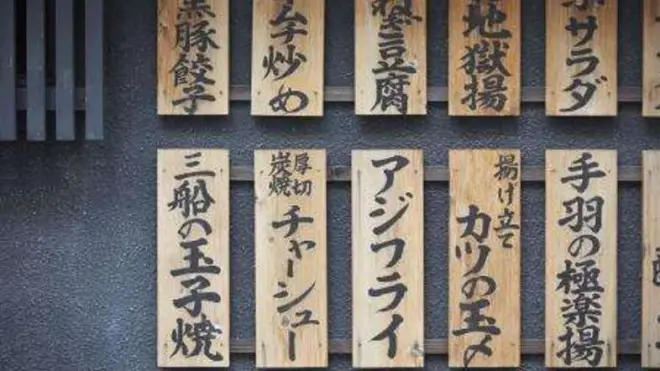【龙腾网】有哪些日本汉字在中国人看来是搞笑的或者毫无意义的?

正文翻译
原创翻译:龙腾网 http://www.ltaaa.com 翻译:滨崎澈 转载请注明出处
What are the Japanese kanji words that are either funny or make no sense to the Chinese?
有哪些日本汉字在中国人看来是搞笑的或者毫无意义的?

评论翻译
原创翻译:龙腾网 http://www.ltaaa.com 翻译:滨崎澈 转载请注明出处
Alexander Tee, lives in Japan
Originally Answered: What are the Japanese kanji words that are either funny or makes no sense to the Chinese?
There are tons, for example:
自慢 (Boastful, prideful) - It has no meaning in Chinese. It literally means “me/myself slow”
我慢 (patient, ensure ) - Similar to above, it just means “I slow” which makes no sense in Chinese
退屈 (boring) - Withdraw bend?
いい加減にしろ (Enough! Cut it out) - Although Chinese will not be able to read the hiragana, but from the Kanji itself, it might means “plus & minus”
勝手に (At your on convenience) - winning hand?
青い (Blue) - Green. This confuses the shit out of me
万引き (Shoplifter) - Ten thousand attraction
To be fair, I think Japanese will find some of the words above weird as well if they take the meaning of Kanji word for word.
For example, in Japanese 加減 also has the meaning plus & minus. The reason why Kanji above looks weird to Chinese is they use the kanji phonetically instead of semantically.
Chinese do so as well but have a certain sets of words specifically for doing so. For example: 奧巴馬 (au-ba-ma; Obama), 澳大利亞 (au-da-li-ya; Australia).
太多了,比如
自慢(吹嘘的,骄傲的)——在中文里毫无意义,相当于“我慢”
我慢(耐心的)——和上面类似,就是“我慢”的意思,在中文里毫无意义。
退屈(无聊)——退出弯曲?
いい加減にしろ(够了!停止)——尽管中国人看不懂平假名部分,但是中国人看了日本汉字部分可能会觉得这是加和减的意思。
勝手に(在你方便的时候)——胜利的手?
青い(蓝)——绿。这简直令我疑惑不解。
万引き(商店扒手)——一万的吸引
公平的说,如果日本人也逐字的去理解这些日本汉字,他们自己可能也会觉得其中的某些很奇葩。
比如,在日语中,加减也有加和减的意思。上面的这些汉字在中国人看来很奇葩是因为他们是在语音上使用这些汉字,而不是通过语义。
中国人也有这么干的,比如奧巴馬 (au-ba-ma; Obama), 澳大利亞 (au-da-li-ya; Australia).

Jason Sudana
Jun 21, 2018
Interestingly in Indonesia, 青 is used for light green, meanwhile 绿 is used of dark green. That is what we’re taught.
有意思的是在马来西亚,青指的是浅绿,绿指的是深绿。学校里是这么教我们的。
Tianhe Yang
僭越-In Japanese, it means “offend”, In Chinese, it means “arrogate”.
麒麟-In Japanese, it means “giraffe”. In Chinese,it means “Chinese unicorn”.
先生-In Japanese, it means “teacher”(also used to call politicians and physicians). In Chinese, it means ”mister”.
手紙-In Japanese, it means “letter”. In Chinese,it means “toilet paper”.
邪魔-In Japanese,it means “hinder”l”. In Chinese,it means “demon”.
馬鹿-In Japanese, it means “idiot”. In Chinese, it means “wapiti”.
勉强-In Japanese ,it means “study”. In Chinese,it means “reluctantly” .
高校-In Japanese,it means high school. In Chinese,it means university (in Chinese, the 高校 is equal to 大學)
中學-In Japanese,it means middle school. In Chinese,it means both middle school and high school(in China, the middle school is called 初級中學 and the high school is called 高級中學)
我慢-In Japanese,it means restrain. In Chinese,it means “i am slow”.
湯-In Japanese&Classical Chinese,it means hot water. In Chinese it means soup.
僭越,在日语中指冒犯,在中文里指霸占
麒麟,在日语里指长颈鹿,在中文里指中国独角兽。
先生,在日语里指老师,也用来称呼政治家和物理学家。在中文里是对男性的尊称。
手紙,在日语里指信件,在中文里指厕纸。
邪魔,在日文里指阻碍,在中文里指恶魔。
馬鹿,在日语里指保持,在中文里指美洲赤鹿。
勉强,在日语里指学习,在中文里指不情愿
高校,在日语里指高中,在中文里指大学。
中学,在日语里指初中,在中文里指初中和高中。
我慢,在日语里指克制,在中文里指我很慢。
湯,在日语和文言文里指热水,在中文里指汤。
Kang-Lin Cheng, studied at University of California, Irvine (2012)
My father first went to Japan 30 years ago. One of the first thing he noticed was that Japanese people are very quiet and generally don’t talk much, not even in public areas. In Taiwan (and many other places), public areas are by far the noisiest places.
In Japanese, the term for Emergency Exit is 非常出口. However, Taiwanese who grew up during my father’s era learned to read Chinese from right to left, even if it’s written horizontally (this is the traditional method of reading Chinese). As such, he read it as 口出常非, which is an incredibly poetic way of saying, “When you talk much, most of your words are not good” (I don’t know how to translate 非 into English; generally speaking, 非 is not a good thing. So maybe “immoral” or “bad”, etc.)
My father went back to Taiwan and told everyone there that the reason why Japanese people are so quiet is because they have signs everywhere reminding them that it’s bad to talk too much.
Yugan Talovich, studied at National Taiwan Normal University
Something I think is funny is 小人, literally a “little person.” In Japanese it means a child, but in Chinese, it means someone with a vile mind, someone who will harm you, someone who has a bad character. I laughed out loud the first time I went to Japan and saw on an entrance 大人、小人。Also, signs say 小人無料, which means Children are admitted free, but 無料 in Chinese would mean people with bad characters have no materials.
Maybe Japanese just don’t like kids?
我觉得有趣的是小人这个词,意思是一个矮小的人。在日文中指小孩子,但是在中文里指邪恶思想的人,会伤害你的人,性格糟糕的人。我第一次去日本看到入口处写着大人和小人字样时大笑了起来。而且还有标志上写着“小人无料”,意思是儿童可以免费进入,但是在中文里,无料指的是性格不好的人没有任何才能。

